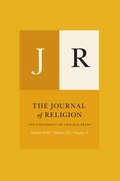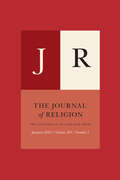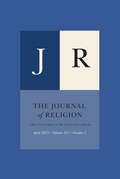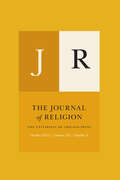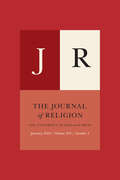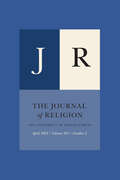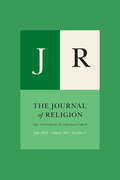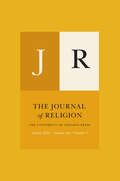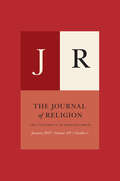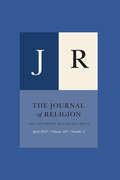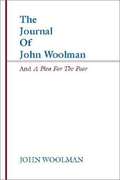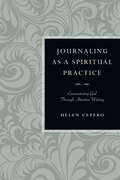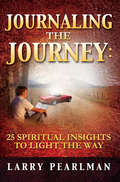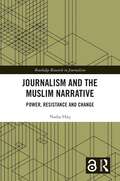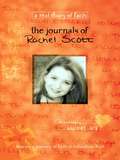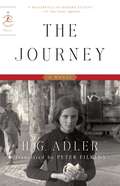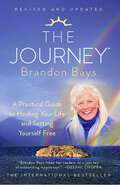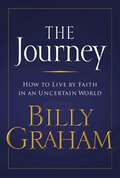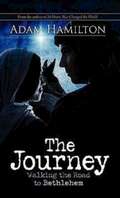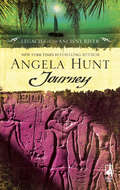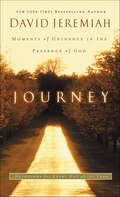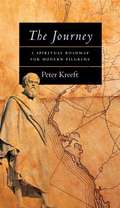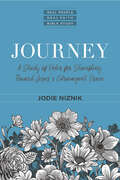- Table View
- List View
The Journal of Religion, volume 102 number 4 (October 2022)
by The Journal of ReligionThis is volume 102 issue 4 of The Journal of Religion. The Journal of Religion promotes critical, hermeneutical, historical, and constructive inquiry into religion. The journal publishes articles in theology, religious ethics, and philosophy of religion, as well as articles that approach the role of religion in culture and society from a historical, sociological, psychological, linguistic, or artistic standpoint. It also publishes highly specialized research in limited areas of inquiry that has significance for a wider readership.
The Journal of Religion, volume 103 number 1 (January 2023)
by The Journal of ReligionThis is volume 103 issue 1 of The Journal of Religion. The Journal of Religion promotes critical, hermeneutical, historical, and constructive inquiry into religion. The journal publishes articles in theology, religious ethics, and philosophy of religion, as well as articles that approach the role of religion in culture and society from a historical, sociological, psychological, linguistic, or artistic standpoint. It also publishes highly specialized research in limited areas of inquiry that has significance for a wider readership.
The Journal of Religion, volume 103 number 2 (April 2023)
by The Journal of ReligionThis is volume 103 issue 2 of The Journal of Religion. The Journal of Religion promotes critical, hermeneutical, historical, and constructive inquiry into religion. The journal publishes articles in theology, religious ethics, and philosophy of religion, as well as articles that approach the role of religion in culture and society from a historical, sociological, psychological, linguistic, or artistic standpoint. It also publishes highly specialized research in limited areas of inquiry that has significance for a wider readership.
The Journal of Religion, volume 103 number 3 (July 2023)
by The Journal of ReligionThis is volume 103 issue 3 of The Journal of Religion. The Journal of Religion promotes critical, hermeneutical, historical, and constructive inquiry into religion. The journal publishes articles in theology, religious ethics, and philosophy of religion, as well as articles that approach the role of religion in culture and society from a historical, sociological, psychological, linguistic, or artistic standpoint. It also publishes highly specialized research in limited areas of inquiry that has significance for a wider readership.
The Journal of Religion, volume 103 number 4 (October 2023)
by The Journal of ReligionThis is volume 103 issue 4 of The Journal of Religion. The Journal of Religion promotes critical, hermeneutical, historical, and constructive inquiry into religion. The journal publishes articles in theology, religious ethics, and philosophy of religion, as well as articles that approach the role of religion in culture and society from a historical, sociological, psychological, linguistic, or artistic standpoint. It also publishes highly specialized research in limited areas of inquiry that has significance for a wider readership.
The Journal of Religion, volume 104 number 1 (January 2024)
by The Journal of ReligionThis is volume 104 issue 1 of The Journal of Religion. The Journal of Religion promotes critical, hermeneutical, historical, and constructive inquiry into religion. The journal publishes articles in theology, religious ethics, and philosophy of religion, as well as articles that approach the role of religion in culture and society from a historical, sociological, psychological, linguistic, or artistic standpoint. It also publishes highly specialized research in limited areas of inquiry that has significance for a wider readership.
The Journal of Religion, volume 104 number 2 (April 2024)
by The Journal of ReligionThis is volume 104 issue 2 of The Journal of Religion. The Journal of Religion promotes critical, hermeneutical, historical, and constructive inquiry into religion. The journal publishes articles in theology, religious ethics, and philosophy of religion, as well as articles that approach the role of religion in culture and society from a historical, sociological, psychological, linguistic, or artistic standpoint. It also publishes highly specialized research in limited areas of inquiry that has significance for a wider readership.
The Journal of Religion, volume 104 number 3 (July 2024)
by The Journal of ReligionThis is volume 104 issue 3 of The Journal of Religion. The Journal of Religion promotes critical, hermeneutical, historical, and constructive inquiry into religion. The journal publishes articles in theology, religious ethics, and philosophy of religion, as well as articles that approach the role of religion in culture and society from a historical, sociological, psychological, linguistic, or artistic standpoint. It also publishes highly specialized research in limited areas of inquiry that has significance for a wider readership.
The Journal of Religion, volume 104 number 4 (October 2024)
by The Journal of ReligionThis is volume 104 issue 4 of The Journal of Religion. The Journal of Religion promotes critical, hermeneutical, historical, and constructive inquiry into religion. The journal publishes articles in theology, religious ethics, and philosophy of religion, as well as articles that approach the role of religion in culture and society from a historical, sociological, psychological, linguistic, or artistic standpoint. It also publishes highly specialized research in limited areas of inquiry that has significance for a wider readership.
The Journal of Religion, volume 105 number 1 (January 2025)
by The Journal of ReligionThis is volume 105 issue 1 of The Journal of Religion. The Journal of Religion promotes critical, hermeneutical, historical, and constructive inquiry into religion. The journal publishes articles in theology, religious ethics, and philosophy of religion, as well as articles that approach the role of religion in culture and society from a historical, sociological, psychological, linguistic, or artistic standpoint. It also publishes highly specialized research in limited areas of inquiry that has significance for a wider readership.
The Journal of Religion, volume 105 number 2 (April 2025)
by The Journal of ReligionThis is volume 105 issue 2 of The Journal of Religion. The Journal of Religion promotes critical, hermeneutical, historical, and constructive inquiry into religion. The journal publishes articles in theology, religious ethics, and philosophy of religion, as well as articles that approach the role of religion in culture and society from a historical, sociological, psychological, linguistic, or artistic standpoint. It also publishes highly specialized research in limited areas of inquiry that has significance for a wider readership.
A Journal of the Life, Gospel Labours, and Christian Experiences of that Faithful Minister of Jesus Christ, John Woolman
by John WoolmanWoolman's Journal was first published in 1774 (shortly after his death). His life, as recorded by himself, was the finest flower of a unique Quaker culture, whose focus, as Howard H. Brinton has put is, was not on the literary or plastic arts but on life itself in home, meeting and community, a life which was an artistic creation as beautiful in its simplicity and proportion as was the architecture of its meeting houses. . . Its distinguishing marks were not dogmas but practical testimonies for equality, simplicity and peace. These testimonies, once revolutionary in their social implications, were already becoming institutionalized in Woolman's time as the badges of a peculiar people. In his quiet way (he must have been the quietest radical in history) John Woolman reforged the testimonies, tempered them in the stream of love and converted them once again into instruments of social revolution.
Journaling as a Spiritual Practice: Encountering God Through Attentive Writing
by Helen CeperoWhether you are a longtime journal keeper or someone who has never kept a journal at all, this book will help you go below the surface of your life with God. It is not about the art of writing, but about how journaling can form us spiritually. Every chapter combines descriptive text, illustrations from journals and the author's own experience with journaling practices integrated along the way to help you bring your own life and world into sharper focus. God wants to surprise you with the beauty of your own life, growing and alive, filled with movement, light and shadow. This is the book to do just that.
Journaling The Journey: 25 Spiritual Insights to Light The Way
by Larry PearlmanJoan Borysenko, Ph.D, New York Times bestselling author of Minding the Body, Mending the Mind: "Do you like a book that grabs your attention and doesn't let go? Or would you prefer a book that offers spiritual direction and insight into your true nature? Journaling the Journey: 25 Spiritual Insights to Light The Way does both!" Think Route 66 meets Yoda. Take 25 Spiritual Insights discovered by the author on his journey through life. Apply them to a cross-country adventure in a red Corvette convertible he took as a young man. Now, see how those insights relate to your own life through journaling and guided introspection. What sets this book apart is Larry Pearlman's easy style and sense of humor mixed with deep wisdom. Journaling The Journey could be read just for the entertainment value and it would be worth the money, but here is an opportunity to literally change the direction of your life and discover the answer to the question of the Ages: Who Am I Really? "After investing years in self discovery & introspection myself, I am convinced beyond a shadow of a doubt, the lessons expressed in this timeless treasure could, and will, change a person's life in a profound & meaningful way, providing they are ready..." Mel Brodsky -- Author of Questions are the Answers and contributor to The Power of Mentorship
Journalism and the Muslim Narrative: Power, Resistance and Change (Routledge Research in Journalism)
by Nadia HaqJournalism and the Muslim Narrative presents an empirical analysis of how modern-day journalism practices contribute to the negative bias against Muslims in Britain, to provide an in-depth investigation of how we can better re-conceptualise journalism for our increasingly multicultural societies.For more than 20 years, media activists and academic scholars have highlighted a bias in British newspapers where Muslims are portrayed as the problematic ‘Other’ of British society. This book draws on the representation of Muslims to contribute a critical, empirical analysis of contemporary journalistic practices in multicultural societies. This includes a deeper insight into media audiences and the public, journalism norms and values such as objectivity, balance and freedom of speech, the wider implications of the increasing digitalisation of the media and the tensions between media structures and journalistic agency. As competition with social media heightens pressures on journalists to produce even more sensationalist and polarising coverage about Muslims, this book further offers a critical evaluation of how journalism needs to be re-imagined to realise its civic role in our progressively digitalised and diverse societies. Drawing on the first-hand accounts of newspaper journalists and editors, the author challenges our understanding of journalism and the role that journalists play in uniting, rather than dividing, our diverse societies. This book builds a critical appraisal of academic perspectives from journalism, media and cultural studies, sociology, postcolonial theory and the study of race and religion, and how journalism practices can either perpetuate or challenge discriminatory and divisive narratives about Britain’s Muslim communities. It will be of value to journalism practitioners as well as academics studying journalism, media and communications, cultural studies and race and ethnicity studies.
The Journals of Rachel Scott
by Beth NimmoWritten teen to teen as a first-person narrative, this is not a book about the Columbine shootings - instead, it's a story of faith, told in Rachel's own words. The book includes first person narratives, journal entries, drawings from Rachel's diary, and notes from her parents and friends at Columbine High School. Additionally, "me pages" (what makes me angry, what I'm afraid of) encourage teens to explore issues central to their lives and faith. Highlighting Rachel's faith journey from the time she became a Christian, through her joys and doubts, her hopes and dreams, this story is a triumphant testimony that teens will treasure.
The Journey: A Novel (Modern Library Classics)
by H. G. Adler Peter FilkinsHere is "a rich and lyrical masterpiece"-notes Peter Constantine-the first translation of a lost treasure by acclaimed author H. G. Adler, a survivor of Theresienstadt and Auschwitz. Written in 1950, after Adler's emigration to England, The Journey was ignored by large publishing houses after the war and not released in Germany until 1962. Depicting the Holocaust in a unique and deeply moving way, and avoiding specific mention of country or camps-even of Nazis and Jews-The Journey is a poetic nightmare of a family's ordeal and one member's survival. Led by the doctor patriarch Leopold, the Lustig family finds itself "forbidden" to live, enduring in a world in which "everyone was crazy, and once they finally recognized what was happening it was too late." Linked by its innovative style to the work of James Joyce and Virginia Woolf, The Journey portrays the unimaginable in a way that anyone interested in recent history and modern literature must read.From the Trade Paperback edition.
The Journey: A Road Map to the Soul
by Brandon BaysHeal your life and set yourself free... In 1992, Brandon Bays was diagnosed with a basketball-sized tumor in her uterus. Already experienced as a healer, she felt she needed to explore alternative means of healing before resorting to surgery and drugs. In the process, she found herself catapulted into an extraordinary soul-searching, and ultimately freeing, journey of healing. Just six and a half weeks after her diagnosis, she was pronounced perfectly healthy. Without the need for drugs or surgery, the tumor had disappeared. The profound process of self-healing that Brandon Bays pioneers has since freed thousands from lifelong emotional and physical blocks. Through the unique work she describes in The Journey , we can learn her deeply transformative techniques and reap the rewards. The Journey guides us directly to the root of any longstanding difficulty and then gives us the tools to resolve it -- finally and completely. This powerful process creates remarkable and lasting results. Chronic pain vanishes. Anxiety, depression, and sexual blocks disappear. Self-esteem, grief, and anger issues dissolve, addictions fall away, and illnesses come to an end. All of us know that deep inside we harbor huge potential. We long to experience it -- yet something holds us back. We long to set ourselves free, yet we don't know how to begin. With practical and easy-to-use techniques, the Journey process enables you to: Strip away emotional and physical blocks Tap into your own inner genius Live life as an expression of your highest potential Experience boundless joy within Become truly free
Journey: A Spiritual Odyssey
by Peter FrancePeter France looks at the various stages of his own spiritual odyssey and talks intimately of his long search for knowledge and enlightenment. Warm, lucid, humorous, Journey is grounded in France's own life and experience. He takes us from the beginning of his journey in a small Methodist chapel in Yorkshire, and his first perception of Christianity, through Oxford where he rejected Christianity and became a humanist and a career as a colonial administrative officer in Fiji, to his later position as an investigative reporter for BBC religious television. Finally-and movingly-he writes about his conversion to the Greek Orthodox Church, and describes his baptism at the age of 57 on the Greek island of Patmos by total immersion in a 44 gallon oil drum of lukewarm water. Illuminated by personal anecdote and information by a broad knowledge of different religions and religious experiences, Journey is both immensely engaging, and studded with powerful spiritual insight.
The Journey: Living by Faith in an Uncertain World
by Billy GrahamBilly Graham is respected and loved around the world. And this work is his magnum opus, the culmination of a lifetime of experience and ministry! Chapter by chapter, Graham leads us on a journey in faith. We learn about God and his purpose for our lives; who Jesus is and what he has done for us. We are reminded of the things God has given us to live successfully: the Bible, the privilege of prayer, fellowship and the church, and the Holy Spirit. We learn to deal with challenges along the way: temptation; wrong thoughts and motives; emotions that can defeat us; habits that destroy our spirit, and what to do when life turns against us. And we are given practical advice on knowing God's will, making right decision, strengthening our marriages, being wise parents, and using our gifts to share Christ with others. With insight that only comes from a life spent with God, The Journey is filled with wisdom, encouragement, hope, and inspiration for anyone who wants to live a happier, more fulfilling life.
The Journey: Walking the Road to Bethlehem (The Journey)
by Adam HamiltonJourney with Adam Hamilton as he travels from Nazareth to Bethlehem in this fascinating look at the birth of Jesus Christ. As he did with Jesus' crucifixion in24 Hours That Changed the World, Hamilton once again approaches a world-changing event with thoughtfulness. Using historical information, archaeological data, and a personal look at some of the stories surrounding the birth, the most amazing moment in history will become more real and heart-felt as you walk along this road. Read The Journey on your own or, for a more in-depth study, enjoy it with a small group. Also available: The Journey: A Season of Reflections The Journey: DVD with Leader Guide The Journey: Youth Edition The Journey: Children's Edition "This book may be the greatest Christmas present of the year. Adam thoughtfully, movingly walks us through what really happened when God touched this planet. The richness of the full story will touch your life as well." John Ortberg, author of The Me I Want to Be: Becoming God's Best Version of You "If you think you know the story of Jesus' birth, think again! This wonderful book sets us on a journey to the times and characters of Christmas so that we experience the birth of Christ in our lives in a new way." Joel C. Hunter, author of Church Distributed "Adam is a pastor who has clearly walked in the footsteps of the Master. This is a timely Christmas gift for a friend no matter where he or she is along 'the journey.'" Rich Nathan, coauthor of Empowered Evangelicals 'Adam Hamilton is one of the finest pastors I know. In addition, his books have long been favorites of mine. The Journey: Walking the Road to Bethlehem will soon be a favorite or yours. Complete with a 28 day devotional and videos filmed in the Holy Land this will add a new depth and joy to your Christmas season." Bill Hybels Senior pastor, Willow Creek Community Church Chairman of Board, Willow Creek Association
Journey
by Angela HuntHis younger brother will be greater than he. . . With those words, Menashe's dreams collapse. As Yosef's eldest son, his position had seemed secure. But now Efrayim--bold, charming Efrayim, who's everything Menashe is not --is taking his place. With their people. With the pharaoh. With Jendayi, the slave Menashe loves. Efrayim, meanwhile, sees his dreams confirmed. Surely it's his destiny to unite the Egyptians and Hebrews. To marry a princess and achieve splendor surpassing that of his brother. Then Menashe's dreams take a dangerous twist as he becomes obsessed with returning the Hebrews to their homeland. If he succeeds, he'll restore their heritage. If he fails. . . he could destroy them all.
Journey: Moments of Guidance in the Presence of God
by David JeremiahIn our complicated, hectic world, we all long for direction in helping us make the best life decisions to assist us in our personal journey. We need guidance, no matter what our circumstances. Each daily reading features a scripture passage, insightful comments from Jeremiah, and a quote from a well-known author that will help the reader chart a meaningful course through life.
The Journey: A Spiritual Roadmap for Modern Pilgrims
by Peter KreeftIn this journey of Spiritual Roadmap for Modern Pilgrims the readers will meet thirteen historical characaters --Socrates, Epicurus, Protagoras, Diogenes, Gorgias, Democritus, Thrasymachus, Xenophanes, Parmenides, Aristotle, Moses, Joshua and C. S. Lewis. You will begin an epic human journey--the journey toward truth. Enjoy a delightful and imaginative allegory of timeless wisdom as you travel along the road of true knowledge. Socrates, the thoroughly reasonable and wise philosopher of Athens, will accompany you much of the way. With sharp questions and canny wit he will coach you past the winsome, the wily and the half-wise spin-doctors of error posted along the ancient byways. Every tempting path will be exposed as a road best not taken.The Journey is an animated and topographical roadmap for modern pilgrims walking the ancient paths in search of reality. Crucial questions present decisive turns in the road:Is there truth? Does meaning exist? Is there right and wrong? Does God exist, and if so, what is he like? These and other essential questions provide guidance that delightfully entertains while directing your mind and spirit on the journey toward the freedom of truth.
Journey: A Study of Peter for Stumbling Toward Jesus's Extravagant Grace (Real People Real Faith Bible Study)
by Jodie NiznikDiscover how Peter's broken pursuit of Jesus can offer us hope and couragePeter was an ordinary man of his time. He started as a humble, hardworking fisherman. But he ended his life with a lasting legacy that still inspires Christians worldwide today. His path from one to the other wasn't smooth or straight. And there is enormous hope in understanding his rocky, stumbling journey of following Jesus.In this eight-week Bible study, Jodie Niznik delves into the ways Peter's missteps and failures reveal God's grace. When Jesus met Peter in those broken places and called him to get back up, dust himself off, and keep following, we are, in turn, taught how to follow Jesus in our own lives. Along the way, Niznik emphasizes mindfulness practices to readers, inviting them to come to each week's study with a quiet mind and ready heart.There is no wallowing in mistakes here, however. Instead, drawing on all four gospels and other supporting Scriptures, Jodie invites readers to see the grace, mercy, and correction of Jesus in the life of Peter, and then to draw parallels to modern Christian lives. Each chapter begins with a spiritual practice that ties into the week's theme to help women engage their heart in the study.Though Peter lived two thousand years ago, he is proof that if God can use an imperfect life like his, then God can and will use Christians today, despite all those ways they feel themselves failing, coming up short, and falling away.
